Meet Maria Corpuz, Founder & Community Builder @ Bel Merch & Design
How would you describe the startup culture in Nebraska?
I would describe the startup culture here in Nebraska as a place where we’re all in our own lanes, but we’re also willing to connect with other people in the startup world to help bring them in and do things alongside each other.
Startups here are always collaborating. Even if it’s just mentoring. If you’re able to sell your startup or it gets acquired, then you still kind of stay within that startup world. I think that helps really build the legacy of the ecosystem here in Omaha. The folks who have been in it for so long are willing to stay, create something new, work with new people and teach that hustle mindset.
There are not as many closed doors to get to what you need. It’s just like, “Okay, I know this one person, and I know that they’re gonna know who I can call.”
How do you balance taking risks and making calculated decisions in pursuit of innovation?
The first thought in my head was that I just go all in. I should definitely balance and be more strategic in my ideas, but I really believe in innovation and doing the crazy work that I’m doing. I do believe it will make a difference sustainability-wise. While I’m not necessarily a “startup,” I do work with a lot of startups. I think my ability to be innovative fits in line with startups through my ability to do research on different products and design, which is something a lot of other people in the promotional world aren’t catching up to yet.
My business allows businesses and startups to use their money as effectively as possible while still designing products that are going to stay around, have an impact and truly help their mission. I think there’s definitely innovation within the strategy. If there’s a startup who’s going to their first conference, they might immediately think, “OK, let’s do 500 keychain beer bottle openers.” And my questions are: Who’s the end user? What’s the budget? How many people are gonna be there?
Nobody wants anything extra on their keys. What if instead of getting 500 of something really small, we use that same budget and get 50 tumblers that are gonna be nice and that you only give to people who give you something? So whether that’s giving you their time later, whether it’s giving you data, whether it’s whatever that ask is, that’s kind of what I really try to understand with my clients is purpose that leads to strategy—purpose-driven strategy.
How do you define success and what metrics do you pay the most attention to?
My creative side wants to define success as how many artists I can pay because I just truly believe in paying artists. I think success, to me, is impeccable customer service and that relationship-building part. The majority, if not all, of my business has been built from referrals. If I can get two to three referrals from one of my current clients, that’s already building that trust again and helping build that relationship.
I work a lot with clients who sell retail, and when they are open to using artwork rather than just their logo, they oftentimes sell out and come back to reorder. Even if they’re just a small photography business or a boutique hotel. When they’re using art on products, and they come back and say, “Why didn’t you tell me to buy more?”—that, to me, is also success. That means an artist was paid, people like their product and people want to use their product. There’s less waste because 66% of promotional products are thrown away. My goal is to live within that 44% of products that have a long, long life in the end-user’s hands.
What are the top one or two challenges / opportunities Nebraska startups face?
There are so many opportunities here to be collaborating with folks in Omaha and or in Lincoln to push your startup forward. You have Startup Omaha Week, Tech Nebraska and the Greater Omaha Chamber all working together to support a robust ecosystem. Then I think that, in turn, provides a challenge because then you have limited resources when it comes to funding—what makes startups run.
I think that Nebraska also needs to do a better job of teaching people about venture capital and how to invest, even if it’s like micro-investments. I haven’t really seen a whole lot of education around that yet, and I think it’s something that people, especially my age in their late 20s and going into their 30s and early 40s, wonder how you even start investing in startups. There are so many great startups here, but people just don’t know how to invest, even if it’s just a few thousand dollars. We need to find ways to engage younger investors.
What is one emerging industry or technology that you believe will have a significant impact on the Nebraska startup ecosystem in the next few years?
I’m gonna go from a community standpoint and say that I’m very excited about Tech Nebraska. I think that it’s an amazing opportunity for startups and big tech alike who work in Nebraska (like Google) to be able to collaborate on policy and laws in Nebraska—how it relates to them and how it can help them and benefit and work in favor of startups.
I’m really excited to see what comes out of this new community. I think that it can be really fruitful and beneficial for the startups to have the big tech involved in the decisions being made in the Nebraska Legislature and have that conversation between the little guys and the big guys.



